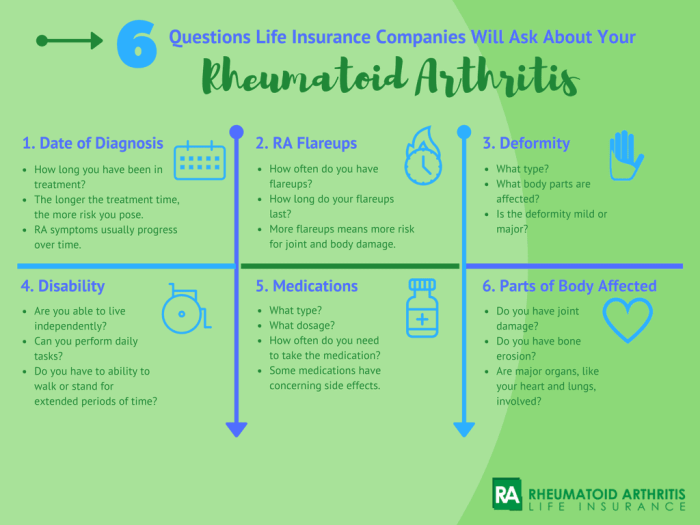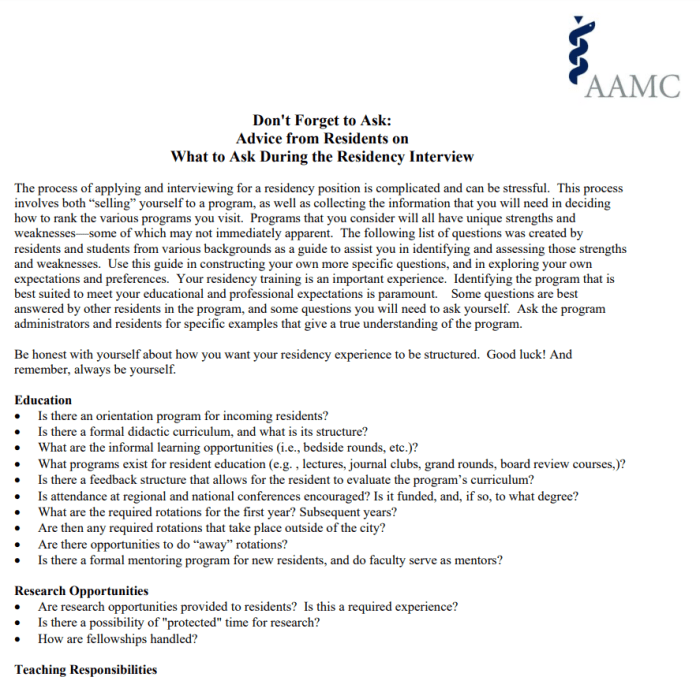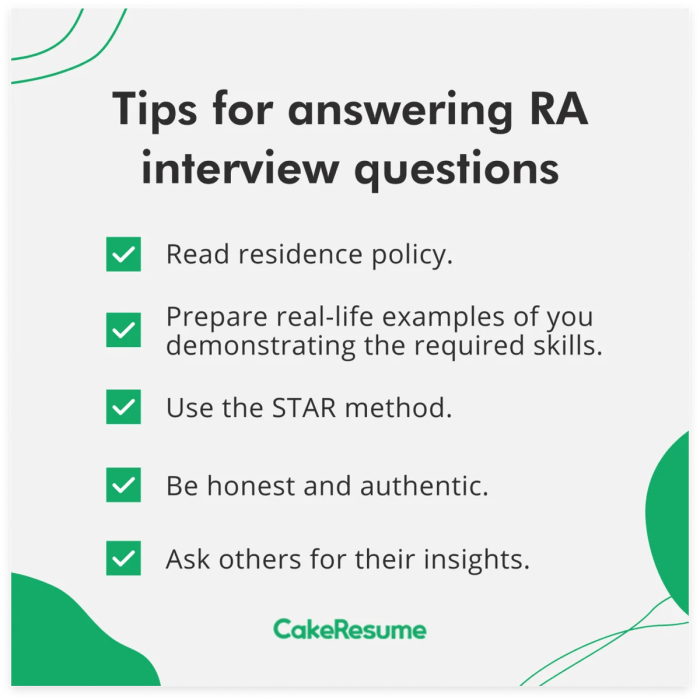Introducing RA questions to ask residents, a comprehensive guide to conducting effective interviews that empower residents and improve their overall well-being. This detailed exploration delves into the art of asking open-ended and closed-ended questions, ensuring you gather valuable feedback for positive change.
Structured resident interviews provide a systematic approach to assessing resident well-being, facility management, staff performance, and activity engagement. By understanding the key areas to focus on and utilizing the provided list of questions, you can effectively evaluate these aspects and drive meaningful improvements.
Resident Interview Structure

Conducting structured resident interviews is a crucial step in understanding the needs and experiences of residents. It provides a systematic approach to gather valuable insights, facilitate decision-making, and improve the quality of care.
A well-structured interview involves a step-by-step process that ensures consistency, reliability, and objectivity. It helps to eliminate bias, reduces the risk of missing important information, and allows for easier data analysis.
Step-by-Step Guide
- Define the purpose and objectives:Clearly Artikel the specific information you aim to gather from the interviews.
- Develop interview questions:Craft a set of open-ended and closed-ended questions that align with the interview objectives.
- Train interviewers:Provide training to interviewers to ensure they understand the interview protocol and ask questions in a consistent manner.
- Conduct interviews:Schedule interviews with residents and follow the established protocol, recording responses accurately.
- Analyze data:Use qualitative and/or quantitative methods to analyze the interview data and draw meaningful conclusions.
Best Practices for Asking Questions
To elicit valuable responses, consider the following best practices when asking questions:
- Open-ended questions:Allow residents to express their views and experiences freely. Avoid leading questions or interrupting their responses.
- Closed-ended questions:Use specific questions to gather specific information, such as demographics or preferences. Ensure response options are clear and comprehensive.
- Probing questions:Ask follow-up questions to clarify responses, explore underlying reasons, and obtain more detailed information.
RA Questions for Resident Well-being

Resident well-being is a crucial aspect of providing quality care. Assessing residents’ well-being allows healthcare professionals to identify areas where improvements can be made to enhance their overall quality of life.
To get the most out of your resident engagement efforts, consider asking the right RA questions. These questions can help you better understand their needs and concerns. For a deeper dive into classic literature, check out the Fahrenheit 451 Chapter 1 Quiz . Coming back to RA questions, open-ended questions encourage residents to share their thoughts and feelings, giving you valuable insights for planning and decision-making.
Physical Well-being
- Ask residents about their physical health, including any pain, discomfort, or mobility issues.
- Inquire about their sleep patterns, appetite, and energy levels.
- Assess their ability to perform daily activities independently.
Emotional Well-being
- Ask residents about their mood and overall happiness.
- Inquire about any feelings of loneliness, sadness, or anxiety.
- Assess their coping mechanisms for stress and difficult situations.
Social Well-being
- Ask residents about their relationships with family and friends.
- Inquire about their involvement in social activities and community events.
- Assess their sense of belonging and connection to others.
RA Questions for Facility Management

Resident Assistants (RAs) play a crucial role in assessing the quality of facility management in student housing. Their feedback can help identify areas for improvement and ensure that the facility meets the needs and expectations of residents.
Key areas to assess include cleanliness, safety, and maintenance. RAs should ask residents about their satisfaction with the following aspects:
Cleanliness, Ra questions to ask residents
- Overall cleanliness of common areas, including hallways, bathrooms, and kitchens
- Frequency and thoroughness of cleaning
- Presence of pests or odors
Safety
- Adequacy of lighting in common areas and around the building
- Security measures in place, such as door locks and security cameras
- Emergency procedures and evacuation plans
Maintenance
- Timeliness of repairs and maintenance requests
- Quality of repairs and maintenance work
- Overall condition of the facility, including walls, floors, and appliances
By gathering resident feedback on these aspects, RAs can identify areas where the facility management may need improvement. This feedback can be used to develop action plans and advocate for changes that enhance the living environment for residents.
RA Questions for Staff Performance

Evaluating staff performance is crucial for maintaining a high-quality living environment for residents. Regular feedback from residents provides valuable insights into the competence, compassion, and professionalism of the staff.
By using resident feedback, RAs can provide constructive criticism and support staff development. This leads to improved service delivery and overall resident satisfaction.
Questions to Ask Residents about Staff Performance
- Are the staff members knowledgeable and skilled in providing care and assistance?
- Do the staff members demonstrate empathy and compassion in their interactions with residents?
- Are the staff members respectful of residents’ privacy and dignity?
- Do the staff members maintain a professional demeanor and appearance?
li>Do the staff members respond promptly and effectively to residents’ requests and concerns?
RA Questions for Activity Engagement

Resident engagement in activities is crucial for their well-being and quality of life. It provides opportunities for socialization, cognitive stimulation, physical activity, and a sense of purpose.
Asking residents about their participation and satisfaction with activities helps RAs understand their interests, preferences, and areas for improvement. This feedback can be used to enhance activity programming, promote resident engagement, and ensure that activities meet the needs and desires of residents.
Benefits of Resident Engagement in Activities
- Improved social interaction and reduced loneliness
- Enhanced cognitive function and reduced risk of dementia
- Increased physical activity and improved overall health
- Improved mood and reduced depression
li>Greater sense of purpose and fulfillment
Questions to Ask Residents
- Do you participate in activities offered by the facility?
- Which activities do you enjoy the most and why?
- Which activities would you like to see offered in the future?
- Are there any activities that you would like to see modified or improved?
- Do you feel that the activities are accessible and convenient for you to participate in?
- Do you have any suggestions for how to increase resident participation in activities?
Using Resident Feedback
RAs can use resident feedback to enhance activity programming by:
- Identifying popular activities and expanding their offerings
- Modifying or discontinuing activities that are not well-received
- Creating new activities based on resident suggestions
- Improving the accessibility and convenience of activities
- Collaborating with staff to ensure that activities are tailored to resident needs
Top FAQs: Ra Questions To Ask Residents
What is the purpose of structured resident interviews?
Structured resident interviews provide a standardized approach to gathering feedback from residents, ensuring consistency and reliability in the data collected.
How can I use resident feedback to improve care?
Resident feedback can be used to identify areas for improvement in care delivery, such as enhancing communication, increasing staff training, or adjusting activity programming.
What are some key areas to assess in facility management?
Key areas to assess in facility management include cleanliness, safety, maintenance, and accessibility.
How can I evaluate staff performance effectively?
Resident feedback can be used to evaluate staff performance in terms of competence, compassion, and professionalism, providing valuable insights for staff development and improvement.
What are the benefits of resident engagement in activities?
Resident engagement in activities promotes socialization, reduces isolation, improves cognitive function, and enhances overall well-being.
